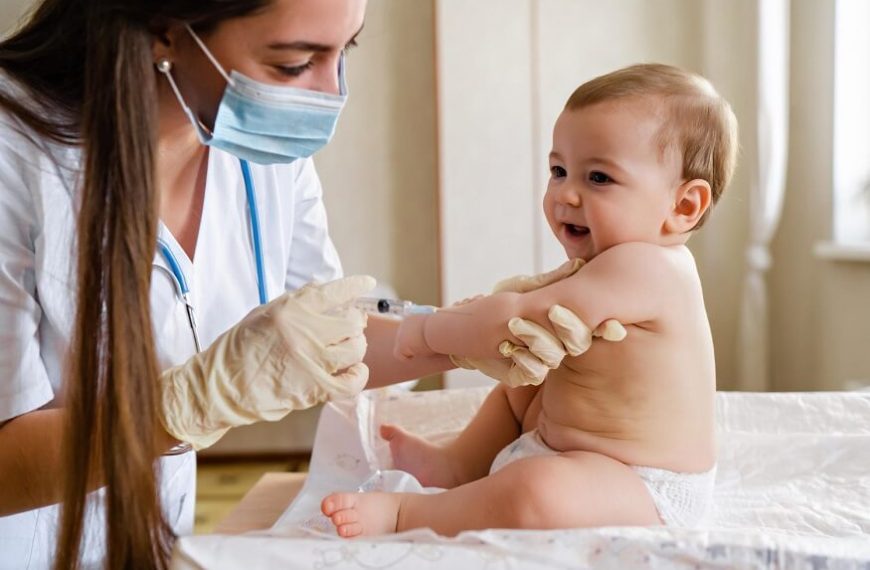Post-Baby Immunisation: What to Expect and How to Care
A critical component of your baby’s health and well-being is immunisation. It helps shield children from a number of major ailments and diseases. It’s normal for parents to worry about what could happen after their child receives their immunisations. There are many things to consider, from the vaccine discomfort duration to post-vaccination infant care and food considerations. This thorough guide will explain what to expect after your baby has their vaccinations and offer helpful tips on how to lessen any discomfort they may feel.
The Initial Discomfort: How Long Does Vaccination Pain Last in Babies?
When their child receives vaccinations, one of the most frequent queries from parents is how long the discomfort will last. It’s crucial to remember that because a needle was inserted into your baby’s skin during the immunisation process, some discomfort is to be expected after that. However, this pain often lasts for a short while. The discomfort and tenderness at the injection site often persist between 24 and 48 hours. Your infant experiencing some redness, swelling, or discomfort where the injection was given is very typical. These common responses show that the body is reacting to the vaccination and developing immunity.
After Vaccination Baby Care: Providing Comfort and Support:
Following their vaccinations, your infant can be fussy or irritable or have a minor temperature. This is how the vaccinations naturally react in their body. There are various actions you may do as a parent to calm and assist your child at this difficult time:
- Cuddles and Comfort: You may ease your baby’s anxiety by holding them close, giving them soft hugs, and speaking to them in soothing tones. For newborns, skin-to-skin contact is proven to be relaxing.
- Monitor Their Temperature: Babies frequently have a little fever following vaccination. Keep a thermometer close by to check their temperature. Consult your paediatrician if the temperature lasts or rises over the safe level.
- Hydration: Make sure your infant drinks enough water so that any temperature or discomfort may be managed. Give your infant the breast more regularly if they are nursing.
- Distraction: Play with or engage your baby in activities that will distract them from any discomfort they may be experiencing. Playing with brightly coloured toys or listening to soothing music are two examples of this.
After Vaccination Food Precautions: Nourishing Your Baby
Following your baby’s immunisations, there aren’t any stringent dietary restrictions, but there are several food safety measures you can take:
- Breastfeeding: If your infant is being breastfed, keep doing so whenever necessary. Essential nutrients and immune-supporting antibodies are provided by breast milk at this time.
- Formula Feeding: There is no need to significantly alter your baby’s feeding schedule if they are formula-fed. Nevertheless, please pay attention to their signals and provide additional comfort feedings as necessary.
- Introducing Solid Foods: Keep your baby’s usual diet intact if they have already begun eating solids. Instead, you might wish to choose softer meals that are gentler on the stomach and simpler to digest.
- Avoid Overfeeding: Although it’s normal to want to feed your infant to make them feel better, do not overfeed. Overeating might worsen any post-vaccination irritation and cause stomach pain.
What Are The Key Side Effects After Baby Jab:
- Fever: The most frequent adverse reaction to immunisations is certainly fever, which is a high temperature of more than 37.5°C. While receiving injections does not infect your kid, the body’s immune system is activated in the same way – to try and promote immunity – and therefore, a fever may occur. Fever is a frequent and typical reaction for all of us to an illness.
- Loss of Appetite: Do not be shocked if your baby stops eating for a bit because this might occur when you do have a fever. However, it would be best if you took care to prevent dehydration in your infant.
- Grizzlies Or More Crying Than Usual: Even if your baby doesn’t develop a fever after receiving their shots, you could still notice that they are not acting like their normal, contented selves. They may also have trouble sleeping. Apart from monitoring a temperature and making sure they are drinking, there is no specific therapy for this. But it is advisable to have tons of comfort and cuddles!
- Soreness/Swelling Around Where They Have Had The Injection: Around the injection site, local responses, including redness, swelling, or pain/discomfort, are frequent. You can give your infant an age-appropriate dosage of paracetamol-based medication to relieve their discomfort if they are displaying concern and acting as though they are in pain due to any swelling in the area around the injection (typically the arms or legs). And don’t worry; this is a typical injection side effect.
- Vomiting/Diarrhoea: After receiving their shots, your baby may become ill or have more accidents than normal in their diapers, which may be related to their vaccinations. The rotavirus vaccine, in particular, might cause mild diarrhoea. Offer additional milk to your infant so that they have enough fluids. However, if you have any concerns, the vomiting or diarrhoea symptoms seem to be becoming worse, or there are any indications that your infant may be dehydrated, do not hesitate to consult a doctor.
How to Reduce Pain After Vaccination: Soothing Strategies
It’s only natural for a parent to want to minimise their baby’s pain. Here are some practical methods to lessen discomfort following vaccinations:
- Cool Compress: A cold, fresh towel applied to the injection site might assist in easing pain and minimising swelling. To prevent pain, make sure the cloth is not too cold.
- Pain Relievers (Consult a Doctor): Your doctor could suggest a modest pain medication like infant acetaminophen or ibuprofen, depending on your baby’s age and the vaccinations they’ve had. But before giving your child any medicine, you must speak with your paediatrician.
- Gentle Massage: The area around the injection site might benefit from a bit of massage to improve blood flow and reduce pain. Make sure your infant is comfortable throughout the process, and use mild pressure.
- Comfortable Clothing: Put on loose, comfy clothing for your infant so it doesn’t rub against the injection site. This can stop the irritation and pain from getting worse.
Navigating Post-Vaccination Care for Your Baby:
Immunisation is a crucial step in ensuring the health of your infant. Even while some discomfort is to be expected following immunisation, being prepared and understanding how to soothe your child may help the process go more smoothly for everyone involved. Keep in mind that every infant is different, and their reaction to vaccinations may differ. You can make sure that your baby’s immunisation journey is as safe and comfortable as possible by providing love care and according to the instructions supplied by your paediatrician. Your child will benefit from a good and healthy immunisation experience thanks to your proactive attitude to post-vaccination infant care, awareness of dietary restrictions, and attempts to minimise pain.
















